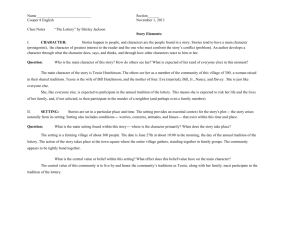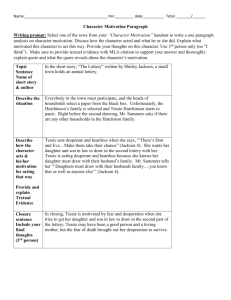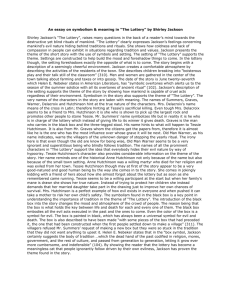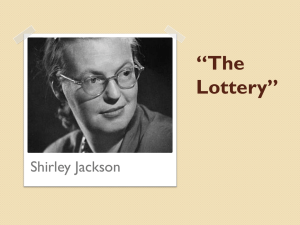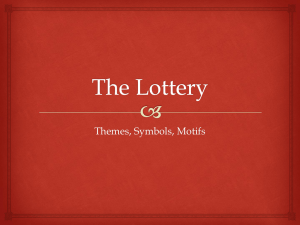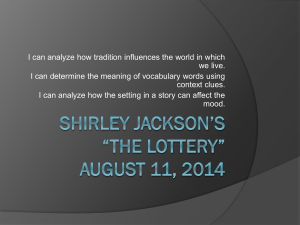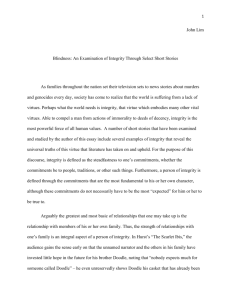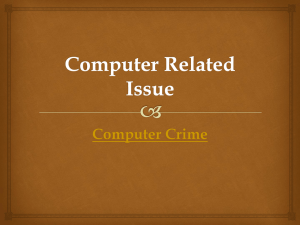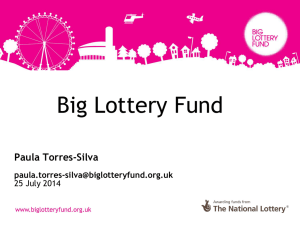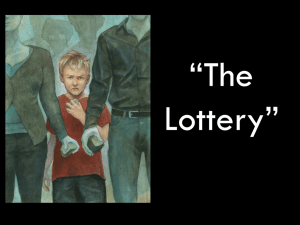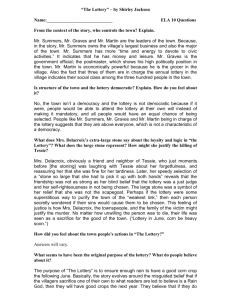Worksheet Review - Union High School
advertisement
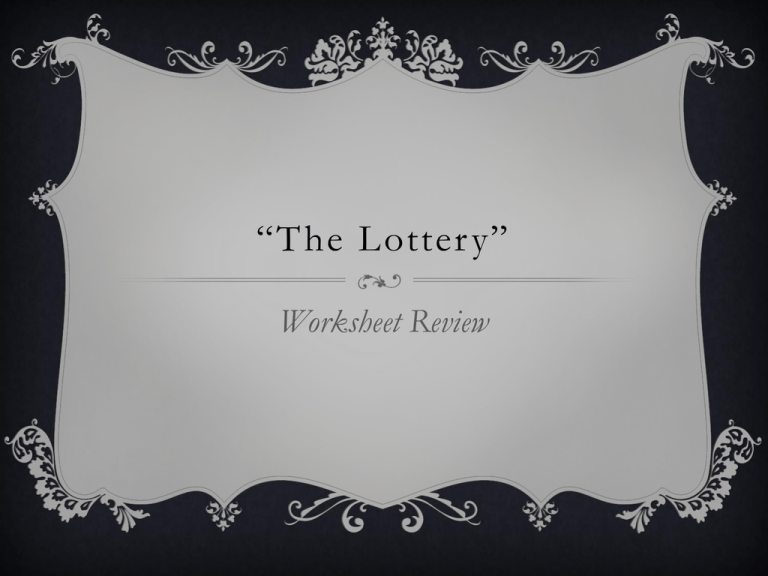
“The Lotter y” Worksheet Review 1. D e s c r i b e t h e s e t t i n g o f t h e s t o r y. • Time: The morning of June 27th (year not identified) • Place: Small, rural village (name/ geographical area not identified) • The lottery is held in the village square, between the post office and the bank 2. H ow m a n y p e o p l e p o p u l a t e t h e village? • About 300 people populate the village • Relatively small population • 12% of UHS population (2,500) • .5% of Union Township population (54,500) 3. D e s c r i b e t h e vi l l a g e r s ’ m o o d o n t he d ay o f t h e l o t t e r y • The general mood appears relaxed and calm, as if this was any other day during the year • Summer-time feel; care-free; children acting jovially • There are clues provided, however, which demonstrate a pensive and reluctant attitude among many of the villagers • “…their jokes were quiet and they smiled rather than laughed” (2). 4. Describe the paraphernalia of the lotter y as well as the pre -lotter y ritual. Paraphernalia = miscellaneous items • Black wooden box (“…grew shabbier each year”) • Slips of paper (one per person), with one slip of paper marked by a black dot (original settlers of the village used chips of wood) • Three-legged stool which holds the black wooden box in place Pre-lottery ritual • Mr. Summers (civic coordinator of the village) is responsible for assembling papers and marking one; black box is held at his coal company office but is held in various locations from year to year 5. Who is late to the lotter y and how does this character react upon realizing he/she is late? Tessie Hutchinson is late to the lottery (foreshadows her fate) She reacts with urgency and rushes to get to the village square She acts cordially when she arrives, making jokes in order to shake-off the humiliation of arriving late • “Wouldn’t have me leave m’dishes in the sink, now, would you, Joe?” 6 . H o w d o e s O l d M a n Wa r n e r f e e l a b o u t other villages getting rid of the lottery? Old Man Warner fears change and warns against the alteration of tradition/rituals • “Pack of crazy fools… Listening to the young folks, nothing’s good for them. Next thing you know, they’ll be wanting to go back to living in caves, nobody work anymore, live that way for a while. Used to be a saying about ‘Lottery in June, corn be heavy soon.’ There’s always been a lottery…” Warner = Village elder who has lived through 77 lotteries; he represents the way things used to be as compared to the way things are heading in the future 7. Consider the old saying, “Lotter y in June, corn be heavy soon.” What seems to have been the original purpose of the lottery? The original purpose of the lottery was for ritualistic sacrifice of one member of the community for the greater good of the whole community • People believed that offering up a human life would ensure a bountiful harvest for all to enjoy 8. H ow d o es M r. H ut ch in s o n t r ea t h is w ife a ft er s h e q u e s t i o n s t h e l o t t e r y. H o w d o t h e o t h e r townspeople react to her? Mr. Hutchinson snaps at his wife: “Shut up, Tessie.” • This demonstrates the power of the lottery over familial obligation The general reaction of the townspeople is one of indifference; they seem to ignore her pleas that the drawing was unfair • This demonstrates the power of social tradition over communal obligation 9. Generally detail the process of the lottery Mr. Summer acts as the coordinator Head of household draws for entire family Drawing is conducting alphabetically by last name The head of the household that draws the slip of paper from black box with black dot on it “wins” the first round of the lottery A separate lottery is conducting within “winning” family The “winner” is stoned to death by all members of community W h a t i s t h e s i g n i f i c a n c e o f Te s s i e ’s f i n a l s c r e a m ? What aspect of the lottery does she explicitly challenge; what aspect goes unquestioned? Tessie screams, “It isn’t fair, it isn’t right!” She challenges the fairness of her being picked but does not question the tradition itself • Perhaps her earlier hints at moving the family to another lottery-free village factor into whether or not she thinks it is “fair” or “right” for her to be chosen? 1 1 . A n o m n i c i e n t n a r r a t o r t e l l s t h e s t o r y. H o w d o e s t h e P OV a f f e c t w h a t w e k n o w a b o u t t h e s i t u a t i o n / p r e s e r v e t h e s t o r y ’s s u s p e n s e ? Omniscient point of view: narrator sees and knows all about the happenings of the story but is not a character acting within story The point of view allows readers an unbiased perspective of a variety of characters and is not limited to any one perspective from one character • The story would be completely different if told from Old Man Warner’s perspective… or Tessie’s perspective Since the story is told by a narrator who sees and knows all, suspense is preserved by Jackson only providing small aspects of individual accounts (this allows clues/hints/foreshadowing) 12. Some critics insist that the story has an a d d e d s y m b o l i c m e a n i n g. W h a t m i g h t Ja ck s o n b e trying to tell us about humankind? Humans are naturally sadistic Humans blindly commit to traditions Humans are dictated by fear (inhibited or motivated to do something unwillingly) Humans will do whatever is necessary for the greater good of the community 1 3 . Wo u l d m u r d e r b e j u s t i f i e d o r m o r a l l y acceptable if it happened due to an accepted, ageless tradition? Answers may vary… Open for discussion! A.If we follow traditions blindly, than anything can be morally justified or customized to “fit” the social norm. B.Under no circumstance should tradition be followed if it compromises the sanctity of human life. 14. How would you respond to cultures that are different from ours that perfor m “strange” rituals? Answers may vary… Open for discussion! A.“To each his own” (respect for cultural differences) B.All strange rituals must be banished! (push for global normalcy) 15. Provide examples of foreshadowing which hint at the s t o r y ’s c o n c l u s i o n . Children gathering stones Tessie arriving late to the lottery Mr. Summer’s comment to Tessie: “Thought we were going to have to get on without you.” The Watson boy draws for his family (his mother and father have died/ “won” past lotteries) Tessie’s protests when her husband, Bill, draws the slip of paper with the black dot on it 16. Identify the symbolic meaning(s) of the following: The Lottery • Ritualistic human sacrifice for a bountiful harvest • Humans’ need to blindly follow social traditions The black box (as well as the stones, stool, lists) • Tradition/Normalcy/Social equity The boys gathering stones • Innocence lost Old Man Warner • Advocate against changing social traditions • Superstition/illogical 1 7 . W hy m i g h t h ave S h i r l e y Ja ck s o n n o t used an existing town or area for this story? Perhaps Jackson wanted her audience to utilize imagination as much as possible? Perhaps Jackson wanted her audience to view this town as if it could exist anywhere/everywhere? Perhaps Jackson did not want her readers to be biased by geographical stereotypes (create neutrality among a varied audience)? Any other ideas? Volunteer and discuss!
